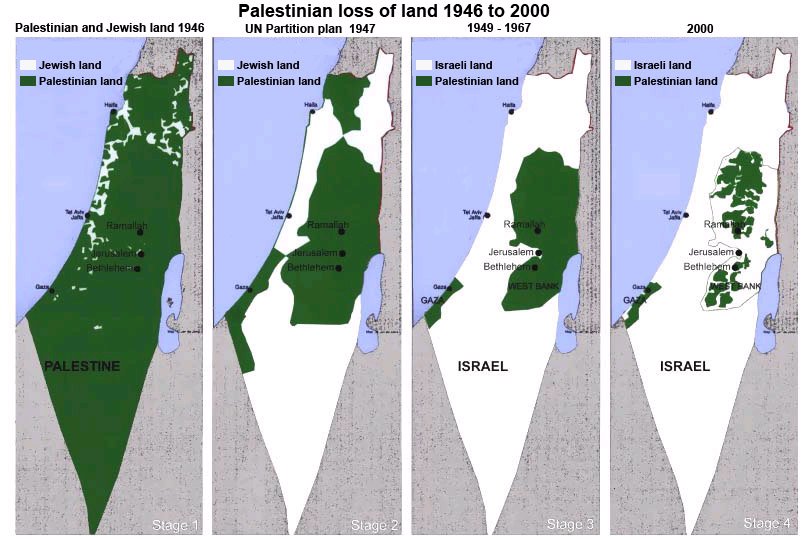Palestine
was first conquered in 1516 by The ottoman Empire who defeated the Mamelukes
and Palestine became a part of the Ottoman Empire. Palestine in 1916 appalled
against the ottomans and in hope that that Britain would help Palestine have
independence in the Middle East. In which now they had been controlled under
the British Mandate. In 1944, Many Arab Leaders had said: "[1]
The situation should not be resolved by inflicting another injustice at the
expense of Palestinian Arabs, or by making Germany's crimes." [2]The Zionists were better
prepared than the Palestinians in which resulted to war. Now, when the United
Nations projected a partition in November, 1947, the Jews accepted it, while
the Arabs rejected it. A war ensued in which the Palestinians were defeated.
When the nation of Israel was established in 1948, five Arab armies came to the
aid of the Palestinians and immediately attacked. The
Arabs in Palestine later said that Palestine was in the same area that had
guaranteed to them. However, Britain denied/said their statement had been
false. Now they have been somewhat conquered by Israel. In 1956-67 and war
broke out once the British had withdrawn from Palestine. In 1967, the war ended
but at a great cost to the Palestinians and the Jewish people. However, the
country Palestine was not the same, Israel had conquered the Gaza Strip and the
West Bank and Palestine was now under control of Israeli government. 1962: A
Palestinian man said: "The Jews Have one, What else is there to say."
[3]
Palestine
Palestinian Loss of State.

This image shows the loss of control the Palestinians had of their country.
Wednesday, March 7, 2012
Independence
In Palestine and on its
perimeters, in exile distant and near, the Palestinian Arab people never weakened
and never abandoned its belief in its rights of Return and Independence. From
out of long years of trial in ever a growing struggle, the Palestinian
political identity emerged further consolidated and confirmed. And the combined
group of the Palestinian national will forged itself in a political name of,
the Palestine Liberation Organization.[1]
Standing on the very rock of conviction in the Palestinian people's unchallengeable
rights, the PLO led the campaigns of the people of Palestine; even as it
suffered massacres and confinement within and without its home. And so
Palestinian resistance was made clear and raised into the front of Arab and
world awareness, as the struggle of the Palestinian Arab people achieved unique
prominence among the world's liberation movements in the modern era. The State
of Palestine is the state of Palestinians wherever they may be. [2]
The state is for them to enjoy in it their collective national and cultural uniqueness,
theirs to pursue in it a complete equality of rights. State of Palestine is an
Arab state, an important and indivisible part of the Arab nation, at one with
that nation in heritage and civilization, with it also in its hope for
liberation, progress, democracy and unity. [3]
The State of Palestine affirms its responsibility to stand for the Charter of
the League of Arab States. It calls upon Arab fellow citizens to unite and develop
the emergence in reality of our State and to strengthen efforts whose goal is
to end Israeli occupation.
Friday, March 2, 2012
Colonial Experience
The Israeli
Government allowed democracy that applies fully to the Jewish citizens only; partly
to Palestinian citizens. However not all to Palestinians in the Territories.
Its justice system, had been administered with the best jurists in the entire
world. But the Israeli government was
different from others: it "functions without a constitution and does not
extend to the territories." Israeli citizens were allowed to travel out of
the country but they needed to pay a travel tax, obtain permission of the
military's army units, and fill out no fewer than 6 forms. However,
Palestinians were not given the right to do so Palestinians, had to deal with a
more restrictive climate of the " Occupied Territories." and they had
no resources. "They could count on neither the institutional nor personal
connections to help them through their daily lives."[1]A
man from the Washington Post wrote in 1990: "For Palestinians, the war of
daily life means that activities as simple as registering for a drivers
license, or obtaining a birth certificate can require weeks of formalities at
more than a half-dozen government offices, including region and local tax
audits."[2] Later,
an organization was created by the Palestinians called the PLO or the
Palestinian Liberation Organization became a representative of the Palestinian
People. However, Israel strongly opposed the PLO for its acts against the
Jewish people. Since 1990s, Israel's
(the Zionists group not the Jewish citizens) continued military activity and subtraction
of privately owned land in the West Bank; and also their control over Gaza.
They are extremely oppressive, with Palestinians having minimal control over
their lives. Over 10,000 Palestinian men, women, and children are held in
Israeli prisons. Few of them have had a legitimate trial; physical abuse and
torture are frequent. Palestinian borders are controlled by Israeli forces. All
the time men, women, and children are searched; people are beaten; women in labor
are prevented from reaching hospitals (at times resulting in death); food and
medicine are blocked from entering Gaza, producing an escalating humanitarian crisis.
Subscribe to:
Comments (Atom)